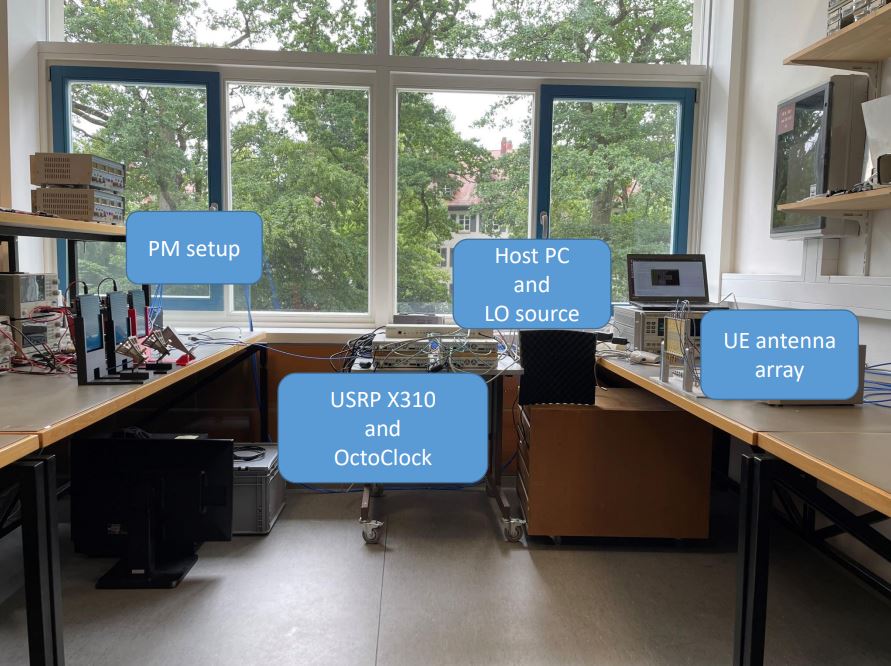METABEAM
- Funding:
DFG
- Project partner:
State Key Laboratory of Millimeter Waves - South East University (Nanjing, China)
- Start:
June 2018
- End:
October 2021
- Contact:
Hybrid adaptive Beamforming Systems using programmable Metasurfaces (METABEAM)
In this project, systems based on PM beamforming have been demonstrated and analyzed. The proposed project goals and additional attractive ambitions discovered during the project are successfully achieved. The main contributions of the project can be concluded as follows, covering both scientific values and marketing demands.
The first reflection type of reconfigurable PM operating at 28 GHz was designed, optimized, fabricated, and measured. It was proved that a PIN diode-based 1-bit reconfigurable PM generates optimum -60° to 60° beamforming along azimuth direction with 2° angle resolution. By implementing different beamforming strategies, various beamforming patterns could be managed to adapt to many types of communication scenarios. These built up the fundamental of the systems, and measurements for different channel estimation as well as beamforming algorithms experimented. In addition, the PM is controlled by a well-designed DC board and enables fast beam switching and beam steering, which was measured to be one of the fastest existing PM beam steerings. Therefore, advanced hybrid beamforming algorithms such as TDMA, real-time UE tracking can be implemented. These experiments were the first group of PM-based systems considering practical communication scenarios working at 28 GHz.
In comparison to a phased array, the PM designed in this project has the advantage of low cost and power consumption. The PM which contains a hundred times more elements than a phased array can be fabricated with the same cost. This contributes to a better beamforming quality since the gain introduced by the larger number of antenna elements beats the degradation caused by the 1-bit phase resolution. Based on this evidence, if PMs can be widely implemented into the market, a large amount of price reduction can be attractive for the companies and governments. Thus, it is convincible that the PMs can play very important roles in the future wireless and mobile communication generations.
As one of the most important achievements of this project, a hybrid MIMO beamforming system based on the designed PMs was demonstrated. Three PMs were used at the transmitter assuming BS, and multiple data streams fully occupying the bandwidth were propagated to the Rx, and recovered with nice SINR performance. This was realized by discovering novel channel estimation and hybrid beamforming algorithms adaptive for the PM-based hybrid beamforming system, which can be regarded as an important milestone. Different from the conventional phased array hybrid beamforming structures, channel state information between each unit cell on the PM at Tx and UE antennas at Rx cannot be derived. As a solution, beam training algorithms were firstly utilized to search for the optimum analog beamforming solution. Afterward, digital channel estimation algorithms took place to derive the effective MIMO channel matrix upon the optimized analog beamforming. According to the estimated channel, different hybrid beamforming algorithms to realize data propagation were finally managed and analyzed.
By the end of this project, the first world-leading full PM-based hybrid MIMO beamforming testbed was established. With the availability and advantages of PM strongly proved, further creative algorithms and mobile communication scenarios can be discovered and realized.
Publikationsliste
Li, Y.; Long, X.; Wan, X.; Eisenbeis, J.; Bettinga, S.; Cui, T.; Zwick, T.
2021. 2021 IEEE USNC-URSI Radio Science Meeting (Joint with AP-S Symposium): Proceedings ; 4–10 December 2021, Singapore, 66–67, Institute of Electrical and Electronics Engineers (IEEE). doi:10.23919/USNC-URSI51813.2021.9703542
Li, Y.; Wan, X.; Eisenbeis, J.; Long, X.; Jozwicka, M.; Cui, T.; Zwick, T.
2020. 2020 International Conference on Microwave and Millimeter Wave Technology (ICMMT 2020 Online), Proceedings, September 20 - 23, 2020, Shanghai, China, 1–3, Institute of Electrical and Electronics Engineers (IEEE). doi:10.1109/ICMMT49418.2020.9386603
Li, Y.; Bettinga, S.; Eisenbeis, J.; Kowalewski, J.; Wan, X.; Long, X.; Li, T.; Jauch, A.; Cui, T.; Zwick, T.
2021. IEEE Wireless Communications Letters, 10 (7), 1542–1546. doi:10.1109/LWC.2021.3073975
Li, Y.; Eisenbeis, J.; Kowalewski, J.; Wan, X.; Long, X.; Jozwicka, M.; De Oliveira, L. G.; Cui, T.; Zwick, T.
2021. 2021 15th European Conference on Antennas and Propagation (EuCAP): 22-26 March 2021, Düsseldorf, Germany, Institute of Electrical and Electronics Engineers (IEEE). doi:10.23919/EuCAP51087.2021.9411368
Li, Y.; Eisenbeis, J.; Wan, X.; Bettinga, S.; Long, X.; Alabd, M. B.; Kowalewski, J.; Cui, T. J.; Zwick, T.
2021. IEEE Antennas and Wireless Propagation Letters, 20 (5), 658–662. doi:10.1109/LAWP.2021.3059322
Wan, X.; Xiao, Q.; Zhang, Y. Z.; Li, Y.; Eisenbeis, J.; Wang, J. W.; Huang, Z. A.; Liu, H. X.; Zwick, T.; Cui, T. J.
2021. IEEE antennas and wireless propagation letters, 20 (3), 381–385. doi:10.1109/LAWP.2021.3050808
Eisenbeis, J.; Pfaff, J.; Karg, C.; Kowalewski, J.; Li, Y.; Pauli, M.; Zwick, T.
2020. Wireless communications and mobile computing, 2020, Art.-Nr.: 8853794. doi:10.1155/2020/8853794
Li, Y.; Eisenbeis, J.; Michev, R.; Alabd, M. B.; Zwick, T.
2020. 13th German Microwave Conference (GeMiC2020), 152–155, Institute of Electrical and Electronics Engineers (IEEE)
Eisenbeis, J.; Li, Y.; Kowalewski, J.; Kretschmann, M.; Zwick, T.
2020. IEEE antennas and wireless propagation letters, 19 (4), 571–575. doi:10.1109/LAWP.2020.2972116
Eisenbeis, J.; Li, Y.; Lopez, P. R.; Fischer, J.; Zwick, T.
2019. 12th German Microwave Conference (GeMiC 2019), Stuttgart, 25.-27. März 2019, 40–43, Institute of Electrical and Electronics Engineers (IEEE). doi:10.23919/GEMIC.2019.8698137


